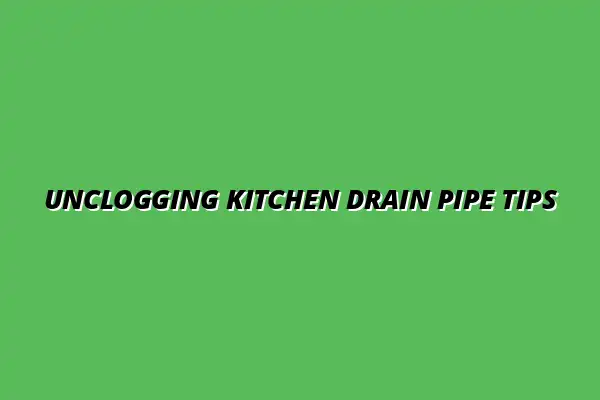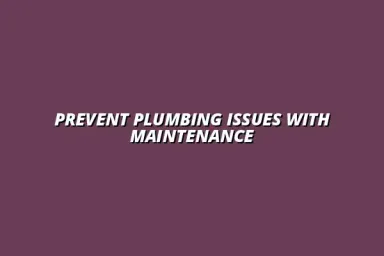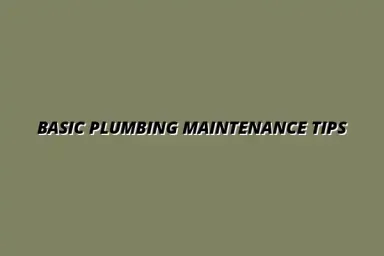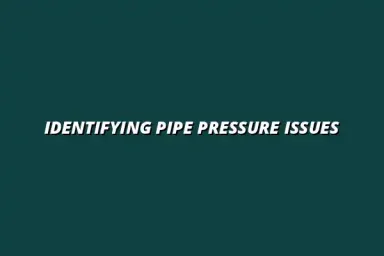Understanding Kitchen Drain Issues
Kitchen drain issues can be a real headache! It's essential to understand these problems well, as they can lead to bigger plumbing disasters if left unresolved. In this section, we will explore the importance of keeping your drain pipes clear and what often causes blockages.
The Importance of Maintaining Clear Drain Pipes
Having clear drain pipes is crucial not just for convenience, but also for the overall health of your kitchen's plumbing system. When water flows freely, it helps prevent unpleasant odors, mold growth, and other serious plumbing issues. Regular maintenance can save you time and money in the long run! For more essential DIY plumbing tips, check out these essential DIY plumbing tips for homeowners.
- Reduces the risk of plumbing emergencies.
- Prevents foul smells from stagnant water.
- Enhances the efficiency of your kitchen appliances.
By keeping an eye on your kitchen drains, you can avoid many common problems. This proactive approach helps maintain a clean and functional kitchen environment. A little attention goes a long way!
Common Causes of Kitchen Drain Blockages
Kitchen drain blockages can happen due to various reasons, and knowing these can help you prevent issues before they escalate. Some common culprits include food residues, foreign objects, and mineral buildup. Let’s take a closer look at these causes!
Food Residue and Grease Accumulation
One of the biggest offenders for kitchen drain clogs is the buildup of food residue and grease. When we wash dishes or food scraps down the drain, they can stick to the pipe walls and create a slippery layer over time. This accumulation can lead to slow drainage and eventually complete blockages.
- Grease from cooking oils.
- Food particles from rinsed dishes.
- Hard-to-dissolve items like rice or pasta.
It's best to scrape leftover food into the trash instead of rinsing it down the drain. This simple practice can significantly reduce the chances of clogs and keep your pipes clear.
Foreign Objects and Debris
Sometimes, foreign objects find their way into the kitchen drain, leading to unexpected blockages. Items like utensils, bottle caps, or even small toys can cause significant problems. Being mindful about what goes down the drain can help avoid these mishaps. Learning how to unclog your drain without plumbing can be very helpful.
- Utensils that accidentally slip into the sink.
- Plastic wrappers or food packaging.
- Hair or small pieces of debris.
To reduce the risk of foreign objects causing blockages, it's vital to use a strainer in your sink. A strainer can catch debris before it reaches the pipes, making maintenance a lot easier!
Hard Water Buildup and Mineral Deposits
Another common issue is hard water buildup, which can lead to mineral deposits inside your pipes. These deposits can restrict water flow and create clogs over time. If you live in an area with hard water, it’s important to take steps to manage this issue. Knowing the signs of a clogged kitchen drain is crucial for timely intervention.
- Regularly cleaning your faucets and fixtures.
- Using a water softener if necessary.
- Flushing your drains with vinegar to dissolve buildup.
By being proactive with maintenance, you can significantly reduce the effects of hard water in your kitchen drains. Keeping your drains clean is essential for ensuring a smooth-running plumbing system!
Addressing Common Questions About Kitchen Drain Maintenance
Kitchen drain maintenance is vital for a smooth-running home. You might have questions about what can harm your drains or how often they need cleaning. Let’s dive into some common inquiries that can help you keep your kitchen running smoothly!
What Should Not Be Put Down the Kitchen Drain?
Knowing what not to put down your kitchen drain can save you from serious clogs. Certain items can cause buildup or blockages, leading to expensive repairs. Here are some items that should never go down your kitchen drain:
- Grease and oil: These substances can solidify and trap food particles.
- Food scraps: Large pieces can easily get stuck.
- Eggshells: While they seem harmless, they can break into small pieces that trap other debris.
- Coffee grounds: These can create sludge that clogs pipes.
- Fibrous vegetables: Items like celery can tangle up and cause blockages.
How Often Should You Clean Your Kitchen Drain?
Regular cleaning of your kitchen drain is important to prevent clogs. Ideally, you should aim for monthly maintenance. Knowing when to clean your pipes is key to preventative maintenance. However, this can depend on a few factors, such as:
- How often you cook: More cooking equals more chances for buildup.
- Type of food you use: Greasy or fibrous foods require more frequent cleaning.
- Number of people in your household: More people can lead to quicker accumulation.
By staying on top of regular cleaning, you can avoid more serious drain issues down the line!
Signs Your Kitchen Drain Needs Immediate Attention
It’s important to recognize when your kitchen drain needs help. Ignoring these signs can lead to bigger problems. Here are some red flags to keep an eye out for:
- Slow draining: Water pooling in the sink is often the first sign of a clog.
- Unpleasant odors: Foul smells can indicate trapped food or buildup.
- Strange noises: Gurgling sounds may suggest air trapped in the pipes.
- Frequent backups: If you notice repeated blockages, it’s time to act. For tips on clog-free drains, see our guide on tips for clog-free drains.
Summarizing Effective Strategies for Clogged Kitchen Drains
Having effective strategies for unclogging kitchen drains can make a big difference. It’s important to evaluate the methods that work best for your specific situation. Let’s explore some key tactics!
Evaluating the Best Methods for Your Situation
Choosing the right method to clear a clogged drain can save you time and frustration. Here are some factors to consider when evaluating your options:
- Severity of the clog: Simple clogs might only need boiling water, while stubborn ones may require a drain snake.
- Environmental concerns: If you prefer natural methods, baking soda and vinegar are great alternatives to harsh chemicals.
- Available tools: Make sure you have the right equipment, like plungers or drain snakes, before starting. If you need help fixing a clogged kitchen sink, professional help is available.
Encouraging Safe and Responsible Drain Care
Taking care of your kitchen drains is about being responsible and proactive. By following safe practices, you can avoid future issues. Here are some ways to promote good drain care:
- Regular cleaning: Make it a habit to clean your drains monthly.
- Use strainers: They can catch debris and prevent clogs.
- Educate your family: Make sure everyone knows what can and cannot go down the drain.
Final Thoughts on Maintaining Healthy Kitchen Drains
Maintaining healthy kitchen drains is easier than you might think. By understanding what to avoid and how to clean effectively, you can keep your drains in top shape. Remember to follow the tips provided, and you’ll enjoy a smoothly running kitchen! For Birmingham residents, consider contacting a local plumber in Edgbaston, Birmingham for assistance.

 Kiran Almasi
Kiran Almasi

